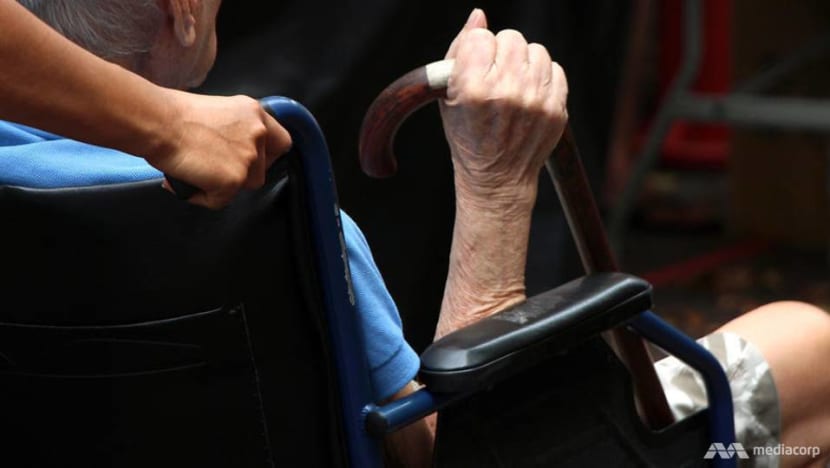Cost a concern for seniors who want to 'age in place': Lien Foundation-NUS study

An elderly man in a wheelchair. (File photo: TODAY)
SINGAPORE: More seniors are "ageing in place" with home and centre-based care services overtaking nursing homes as the main form of long-term care for elderly Singaporeans, according to a new study.
In 2017, 14,000 people received subsidised home and centre-based care compared to 10,000 seniors who are cared for in nursing homes, said the Lien Foundation study, citing figures from the Ministry of Health (MOH).
But these services do not come cheap.
It is more expensive for a family to look after a severely disabled senior at home than admitting them to a nursing home run by a volunteer welfare organisation (VWO), according to the study which was released on Tuesday (Aug 14).
A family looking after a severely disabled senior at home could pay up to S$3,100 per month, including transport and consumables before subsidies. This is higher than the median full cost of S$2,400 for looking after the same person in a VWO-run nursing home.
The cost for centre-based care is between S$900 and S$2,200 per month, according to the report which was co-authored by National University of Singapore academics Associate Professors Elaine Ho and Shirlena Huang.
“Even as Singapore works to enable seniors to remain healthy, active and engaged for as long as the can, it must be mindful that more will need care and that quality long-term care can be expensive,” said Ms Radha Basu, director for research and advocacy at Lien Foundation which commissioned the study to shed light on the state of formal centre-based and home-based care for seniors in Singapore.
Although two-thirds of all households now qualify for means-tested subsidies, the study found that co-payment is a key concern, as they would still be paying between 20 per cent and 70 per cent of the cost even after subsidies, the report found.
Costs may even deter middle-income families from using formal long-term care services, especially since many find it cheaper to hire a domestic worker instead, Assoc Prof Ho said.
However, maids may not be trained enough to handle complex care needs and sometimes, could end up compromising the well-being and health of vulnerable seniors, according to the study.
Other than financing of long-term care, the study also looked at the demand and supply of services, human resource capabilities, care quality and governance.
CAPACITY AND GOVERNMENT SPENDING
Despite the demand for such care services, and a ramping up of home and centre-based places in Singapore from 5,900 in 2011 to 13,000 last year, capacity for certain services may not be enough, the study found.
In 2015 for example, the Agency for Integrated Care (AIC), which coordinates Singapore's long-term care services, received 7,800 referrals for day care services, more than double the 3,500 day care places that were available that year.
The number of places increased to 5,000 in 2017, but this still fell short.
"The need has likely increased since then," said Lien Foundation and the academics.
Despite a substantial rise in long-term care spending by MOH in recent years, the spending amounted to only 8 per cent of the healthcare budget and 0.19 per cent of Singapore's Gross Domestic Product for the year, the report added.
Long-term care spending was S$800 million in 2016, up from the S$600 million in 2015.
The proportion paled in comparison to the average of 1.4 per cent that OECD countries spent in 2014 on the long-term care sector, according to the report.
REGULATION OF CARE QUALITY NEEDED
Another issue highlighted by the study is the lack of regulation in the sector. Unlike nursing homes and childcare centres, home-based and centre-based care are not licensed in Singapore. Only two out of about 60 private home care providers are subjected to mandatory service requirements stipulated by MOH because they receive Government grants and subsidies.
Singapore therefore needs to strengthen the regulatory environment of community-based eldercare, said Assoc Prof Huang. "The elderly and others needing care at home are particularly vulnerable groups. Safeguards for home care must be put in place," she said.
The study also emphasised the need to set accreditation, as well as training and certification standards for all providers and workers in the sector.
There is also the challenge of attracting and retaining workers in the sector. At the media briefing, the panel said that some workers in the sector may be earning S$1,300 - less than a salesperson, who earns S$1,500.
The study recommended public spending on community and home care be boosted to ease the cost burden on users and providers. It also called for the broadening of financing options by, for example, extending Medifund coverage. It also recommended that eldercare careers be boosted, and care competencies improved.
In response to the findings, MOH said it will study the views and ideas raised.
"We welcome constructive conversation on these important and pressing issues, as we continue to work with partners and stakeholders to strengthen the provision of home and community care services," a spokesperson said.












